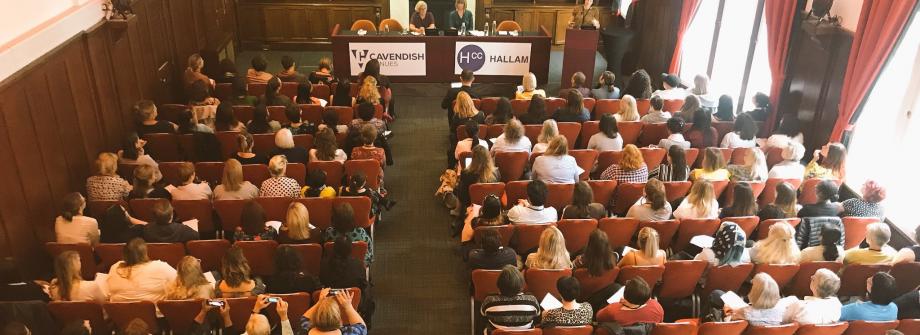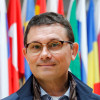
12 October 2018 in London, UK
200 nurses and allied professionals gathered to listen to 11 speakers who described the most important biological and medical aspects of CAR-T Cell therapies. The presentations were tailored to meet with the educational needs of nurses and allied professionals who are key in the safe administration of CAR-T Cells and follow-up of patients treated with this new category of gene therapy medicinal products.
Órla Stewart chronicles the highlights of this first CAR-T education day for nurses and Christian Chabannon explains the EBMT strategy for the emerging therapies. You can read their articles below.
 Órla Stewart, Lead Haematology Nurse at the Kings College Hospital (London), member of the EBMT Nurses Group and organiser of this educational day
Órla Stewart, Lead Haematology Nurse at the Kings College Hospital (London), member of the EBMT Nurses Group and organiser of this educational day
‘Catching the wave’ and ‘filling the void’ are just two of the many phrases that capture the spirit of the first CAR-T education day for nurses. After a fairly controlled emergence of CAR-T therapies over the last two years or so, all things CAR-T have recently gathered huge momentum with a subsequent demand for information, education and support for those already offering CAR-T as well as those new to this transformational area of care.
The recent growing excitement in this area was mirrored by the delegate registration records. The programme was designed to the address the real educational needs of our nursing workforce in this cutting-edge treatment which, for a select group of haematology patients may revolutionise outcomes. We were honoured to welcome Dr Christian Chabannon, chair of the EBMT CTIWP, who in his opening address explained the EBMT strategy for the emerging therapies (see below). The first plenary session by Dr Elaine Vickers was a brilliant masterclass on the biology of CAR-T. She very artfully translated complex cell therapy into a process that was understandable and accessible to participants at all levels.
Dr Reuben Benjamin, Consultant Haematologist Kings College Hospital gave an overview of the CAR-T progress to date followed by Dr Claire Roddy, Consultant Haematologist, University College Hospital talking about the UCLH experience and some future aspects of CAR-T treatment including the solid tumour developments. The morning session was closed by Dr Victoria Metaxa, Consultant in Critical Care Kings College Hospital with a stimulating and informative insight into the perspective of the Critical Care teams dealing with the toxicities related to these emerging therapies.
The buzz of networking was audible during the lunch time break. Nurses from all over the UK and Europe were rapidly exchanging ideas and sharing their experiences.
Immediately following lunch, we were fortunate to hear the thoughtful and inspiring story from a patient who having undergone extensive treatment for ALL received a CD19 allogenic CAR-T last year. Matthew brought his real-life experience to the whole room. Click HERE to read Matthew story.
Moving on from Matthews narrative was tough call as we proceeded to the nursing sessions. Led by Jan Chu and Danielle Pinner, research nurses from Great Ormond Street Hospital we learned how to deal with CAR-T related encephalopathy syndrome, with some interesting case studies from their service.
Rose Ellard, Senior Research Nurse at Kings College Hospital delivered an excellent talk on cytokine release syndrome, the most common toxicity with CAR-T therapy. Rose’s experience dealing with this toxicity shone through giving us all an excellent learning opportunity.
The day closed with a joint session by myself and Nikki McKeag. Nikki is the lead nurse for BMT at Southampton University Hospital. This session focused on how as nurses we can work collaboratively to manage patient expectations and ensure that the pathway for these patients runs as smoothly as possible.
The full room as the programme drew to a close was testament to the interest and commitment of the nursing community to ensure learning effectively together equips us to care for patients effectively through this new and very exciting development.
 Christian Chabannon, Chair of the EBMT Cellular Therapy & Immunobiology Working Party, and Vice-Chair of the EBMT Scientific Council
Christian Chabannon, Chair of the EBMT Cellular Therapy & Immunobiology Working Party, and Vice-Chair of the EBMT Scientific Council
I was honored and delighted to introduce this study day, and present the EBMT strategy to support the development of this emerging new field in hematology and medical oncology. This includes collaborations with competent authorities, health technology assessment agencies and pharmaceutical companies to organize long-term follow-up of patients as mandated by both FDA and EMA, and Post Authorization Safety Studies (PASS). This also includes educational activities, either stemming from existing meetings such as the EBMT Annual Meeting or existing mid-size events, or creating dedicated mid-size events such as the upcoming 1st EBMT CAR-T Cell workshop in Paris early next year. Finally, EBMT is working towards the definition of a specific set of standards, taking advantage of the FACT-JACIE accreditation process, in order to provide objective tools and help qualify centers that are willing to provide access to immune effector cells therapies for their patients.
The success met by this first study day for haematology nurses, focusing on CAR-T Cell therapies, exemplifies the existing needs in terms of educational activities and how professional associations, cooperative groups, patients representatives and advocates must team up in order to fulfill these needs.